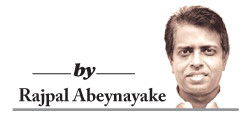 The bets are on that nobody would be able to gain 50 percent of the vote in any presidential election that would be held in the near future. What would seasoned political commentators say? Here we go again?
The bets are on that nobody would be able to gain 50 percent of the vote in any presidential election that would be held in the near future. What would seasoned political commentators say? Here we go again?
The 50 per cent issue has been brought up before every presidential election, and in almost all instances various pundits have speculated that the vote would go into a second round where second preferences would be counted. But it never happened in any past contests for president in this country.
Talk about the arc of history. If history was written according to the prognostications of pundits, aliens would probably be ruling the planet by now. But, each time a pundit made a prediction either before an election or during regular times, it has caused a flurry of news stories and follow-up analysis to manifest from nowhere and hog feature page headlines.
Pundits predicted that the Cold War wouldn’t end and the end of communism of the Mao-Brezhnev variety would not happen unless it’s in the aftermath nuclear war. But when it happened and the Berlin Wall came down after a few protests and calls to ‘tear down this wall’, the historians who made the earlier predictions pretended they never said anything about the indestructible communist empire.
EMPHASIZED
That way, the laws of the universe or such that are observable are quirky, and some may say, even perverse. But everything that doesn’t keep to the straight and narrow, isn’t perverse. Nobody predicted a UNP rout of the proportions that took place in 1970. Nobody predicted that eight years later, the Sirimavo Bandaranaike government would suffer a similar fate, except it would be much worse.
Pundits’ prognostications this year are about a second round in the presidential polls, and perhaps if the general elections are held first, a hung parliament. We have had our share of hung parliaments and the most memorable of them were during the Chandrika Kumaratunga’s presidency.
But we have had anything but hung parliaments after that, and that has been cumbersome to a point people have begun to almost wish for hung parliaments. The parliaments we have had in recent times have been top-heavy and governments or governing coalitions have commanded two-thirds majorities or close to that. It shows again that the pundits were left scratching their heads because they predicted during president Kumaratunge’s time that hung parliaments would be the order of the day.
It has been in rare instances that the pundits in any country got it right. In 2016 in the US, they predicted a Hillary Clinton victory, but the pundits were left with much egg on their faces, along with predictive models they had to hide. There were responsible academics so called who predicted that there is zero chance that Donald Trump would be elected US President, incidentally. Zero, they emphasized.
It’s not who you like or who you don’t like as the winner of any elections. It’s about predicting with any degree of accuracy what may happen. People are notoriously cagey but their potential choices.
They don’t reveal their true intentions in the pre-election polls, which is why they say that the only poll that matters takes place on election day. Besides that, all the predictions before elections are coloured by the political biases of the pundits who generally tend to all follow a similar line in a given country, in a given context.
When people say securing 50 per cent would be an impossibility for any candidate, they figure that the general two-party dynamics have changed. But they were wrong about which two parties would dominate elections in their previous outings as pundits and opinion-makers.
WAGER
By far most of them never believed that parties other than the UNP and the SLFP would be able to top the lists and change that particular electoral dynamic of post independence two party dominance in a way nobody imagined. But both the SLFP and UNP have been overtaken by other parties.
Those who got it wrong so badly in recent times now say their predictions are ironclad. Even if they may (or may not) be eventually right about no candidate scoring more than 50 per cent in a presidential poll in the near future, it can be guaranteed that the pundits would be wrong about more other matters concerning the election and the immediate future trajectory, than they would be right.
What the pundits generally predict is the scenario they think is about to unfold. But they won’t — or they can’t — take a look at the stray developments, or the so called wild card situations and the possible black swan events that may happen before the voting gets underway.
This time around most of the sages are stumped because everything seems to defy liner logic. It’s not clear yet which presidential candidate would be fielded by which party or which particular coalition of political parties, and as a result some have decided that by default an outsider is poised to become the runaway winner this time around.
This is to pile more linear logic onto a situation in which they think linear logic is inadequate. They are also not factoring in the powerful backing that each potential contender might receive.
This powerful backing can come from various sources that may not necessarily show their hand. It is also difficult to discount the block vote, which is something this writer has written about in previous columns in this space.
The block vote would not disappear into thin air and despite everything that’s being said, the main ‘progressive/nationalist party’ and the most important ‘right-wing’ party in the mix would receive their shares of the block vote.
The candidates of these main parties have not begun campaigning and when they do they could add to that block vote bank. Getting upto 50 per cent of the vote in any presidential election would not be difficult under the circumstances for any of these parties fielding credible candidates.
Those who are in the business of predicting are not always in the business of predicting. They are most often creating narratives that they would wager, would be favourable to their candidates on the long run.
The polling business is also at times at least not designed to give an indication of which way the wind is blowing but is rather a business of trying to make the wind blow in a certain preferred direction.
Those who say nobody would poll more than 50 per cent at a presidential election, go so far as to predict which way the preference votes of the eliminated candidates would be cast, in the event there is a second round of voting. Predicting preferences this early in the game is futile and those who are in the prediction game know it.
TIMING
That arc of history is seldom determined by the zeitgeist, by the way. The zeitgeist by definition is ephemeral. There is always something round the corner that would change everything and sometimes stand things completely on their head.
However, it is not as if the celestial powers have one aim which is to confound the pollsters and the pundits. It’s just that people have a linear or one dimensional view of a world that’s in constant flux and that they rely too much on linear logic.
What can be said about the period ahead of us is that it is suffused with variables known and yet unknown. Besides that, there is plenty of room for the unexpected to happen particularly when things are not clear at all, and the situation is somewhat conducive to the wild card and the black swan.
Perhaps the devil in the detail — such as whether second preference votes would count — would be irrelevant. There may be other considerations such as the timing of the elections.
When would they be held eventually, and in what order? The economy is a primary consideration for voters as things stand but this may also change as we get closer to the polls. As for those who take it for granted that they would win this election, well, history rarely rewarded those who took things for granted. They may feel they can present a few statistics about second-preferences and make things interesting when ‘they are sure’ the boring fact is they are going to win anyway. But feeling so cocky, is of course to live in a fool’s paradise.




